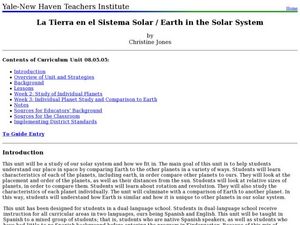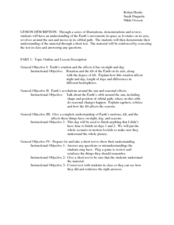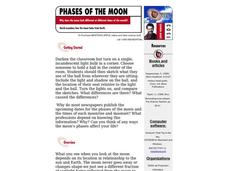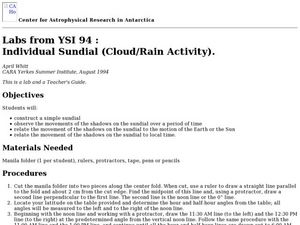California Academy of Science
Kinesthetic Astronomy: Birthday Stars
Space explorers take a virtual trip around the sun right within your classroom! They stand in a circle facing away from the "sun" (a lamp) in the center of the room. As they move according to your instructions, they view different...
Curated OER
Models of the Earth and Moon
Students explore the earth's rotation and phases of the moon. In this planets instructional activity, students rotate and revolve around a light representing the sun. Students use movement and props to simulate what causes the phases of...
Curated OER
Earth, Sun and Moon
Students explore, experiment and study how the Earth orbits the Sun once a year and how the moon takes approximately 29 days to orbit the Earth. They access an online activity to examine the process of how the Sun is at the center of the...
Curated OER
Who Wants to be a Millionaire? Solar System
Fifteen questions about our solar system make up this interactive review game. It was written by a teacher in the UK, and therefore the monetary winnings for answering correctly are in pounds. The content applies, however, to any...
Curated OER
Earth in the Solar System
A three-week unit designed to be completed in an elementary level, dual-language immersion classroom, this resource includes several lessons intended to introduce young learners to the solar system, the Earth and how the Earth compares...
Curated OER
The Four Seasons - Earth's Rotation
Young scholars identify characteristics in correlation with each season and identify dates of the changing seasons. They identify and describe how the Earth rotates around the sun and its effects on the temperatures of the earth.
CK-12 Foundation
Coriolis Effect: Flying... South?
It turns out there's a lot more to heading south for the winter for migratory birds! Study the Coriolis Effect with a fun, hands-on teaching tool. Pupils take to the skies as a small red bird bound for the tropics from his frosty home at...
Mr. E. Science
The Earth in Space
Do you think Earth makes fun of other planets for having no life? The presentation covers the rotation and revolution of both the earth and our moon. It provides explanations for seasons, tides, and eclipses. Lesson is the 20th in a...
Space Awareness
Seasons Around the World
Why does Earth experience summer, fall, winter, and spring? Using an informative demonstration, learners see how the angle of the sun on Earth and the rotation of Earth determine the seasons. Scholars work in pairs to learn that the...
Curated OER
Day and Night
Inform your elementary scientists why we experience day and night. They are provided with facts and explanation as to why the day and night cycle occur, discuss what they've learned with a partner, and are then given the task of writing...
It's About Time
How Do Earth's Orbital Variations Affect Climate?
How does Earth's orbit around the Sun affect climate? This third installment of a six-part series looks at how Earth's orbit affects the amount of insolation at locations on Earth involves different experiments used in conjunction...
Curated OER
Earth's Movement in Space
Students explain how the Earth's tilt and rotation causes night and day. In this earth science lesson, students determine how seasonal changes are caused by Earth's revolution. They play a jeopardy team game at the end of the unit to...
Curated OER
The Earth is Flat
Third graders experiment to gain understanding of the shape and rotation of the Earth. In this Sun and Moon science instructional activity, 3rd graders understand that the Earth rotates on its axis and how that explains the appearance...
Curated OER
Warming the Earth
First graders investigate how the sun warms the Earth and examine the rotation of the Earth and the sun. They create an illustration of the sun, examine a solar system model, and listen to the book "The Sun: Our Nearest Star." They also...
Curated OER
Earth's Tilt Creates Seasons
Learners examine how the Earth's tilt creates the seasons. In this seasons lesson plan, students study a diagram that shows the rotation of the earth around the sun and how it tilts during the rotation. They answer 4 discussion questions...
Curated OER
Earth And Its Moon
In this earth and moon worksheet, students read 4 different statements about the placement of the earth and moon during different times. Students write in the effect of each of these statements. This worksheet is a graphic organizer.
Curated OER
Day and Night
Fifth graders investigate the Earth's rotation and revolution and the moon's orbit around the Earth. They participate in a class discussion about how night and day occur, and take notes. Next, they watch a video about the solar system...
Channel Islands Film
Island Rotation: Lesson Plan 1
How do scientists provide evidence to support the theories they put forth? What clues do they put together to create these theories? After watching West of the West's documentary Island Rotation class members engage in a series of...
Radford University
Google Earth Trip
A trip around the world sounds nice, but for now we'll just have to make do with Google Earth. Pupils use pictures of landmarks to apply geometry concepts. They determine whether each building has bilateral or rotational symmetry, search...
Curated OER
Phases of the Moon
Young scholars explore why when you examine the moon depends on its location in relationship to the sun and Earth. The moon never goes away or changes shape-we just see a different fraction of sunlight being reflected from the moon to...
Curated OER
What Causes Day and Night?
In this day and night instructional activity, students will that day and night are caused by the Earth's rotation on its axis and that the sun shines on different parts of the Earth. This instructional activity has 4 fill in the blank...
Curated OER
Individual Sundial (Cloud/Rain Activity)
Students make a simple sundial to examine the changes in shadows over time. In this sundial and shadow instructional activity, students make a simple sundial out of a manila folder and pencil. They observe how shadows change over time,...
NOAA
Tides
Sometimes low, sometimes high, but always in motion! Explore Earth's tidal system in the 10th interactive in a series of 13. Engaging life and earth science students alike, the versatile resource demonstrates cause and effect between...
Curated OER
Earth's Place in Space
In this Earth worksheet, students review how the revolution, rotation, and tilt of the Earth effects the Earth. This worksheet has 4 matching and 3 short answer questions.

























